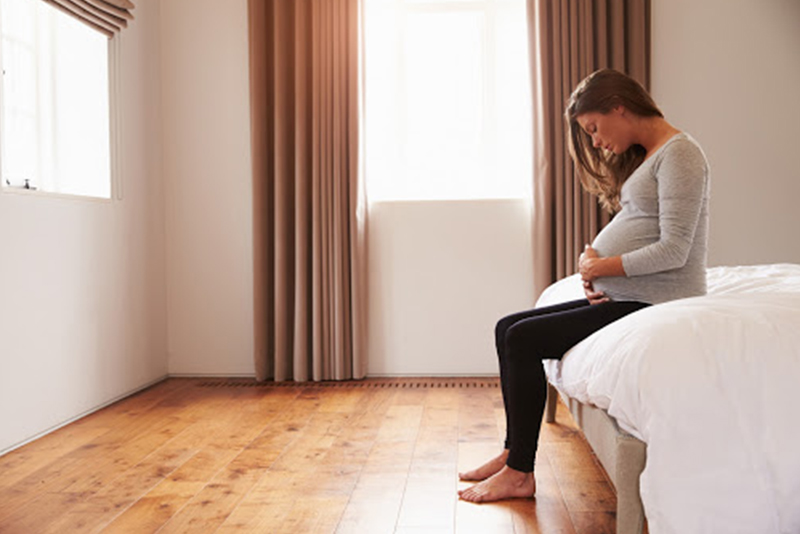How To Sleep When Pregnant – It’s crucial for your well being to get a good night’s sleep each and every night, but It can be hard to find the right sleeping position during pregnancy. Here’s how you can sleep better during yours.

Why Are You Uncomfortable In Your Normal Sleeping Position?
How does pregnancy affect your sleep? Your body has undergoes a number of changes during pregnancy that can make your sleeping position uncomfortable, thus reducing your sleep quality. Here are a few factors that may be affecting how many hours of sleep you’re getting each night.
Increased size of your uterus and abdomen
A woman’s body changes significantly during pregnancy as the uterus and abdomen girth grows significantly. This causes added weight in your midsection and a shift in your balance, making it difficult to find a good sleep position. This discomfort can increase as you enter your third trimester, making it difficult to stay asleep.
Heartburn
A common occurrence during pregnancy that can make it difficult for you to sleep at night is heartburn. Your progesterone levels can increase when you are pregnant. This can cause the valve between your esophagus and stomach to relax, enabling stomach acid to enter your esophagus, leaving a burning sensation in your chest.
Insomnia
Sleepless nights may be triggered by your pregnancy, and when this gets out of hand, it may affect you and your baby. But not to worry, about 78% of pregnant women experience insomnia at some point during their pregnancy [1].
Increased bathroom visits
Another common factor affecting sleep during pregnancy is increased urination thanks to the uterus is pushing against the bladder. Frequent urination can lead to poor sleep especially during the third trimester.
Morning sickness
If you think your morning nausea is limited to the mornings, you might be surprised to find that you can be jolted awake because of nausea.
Leg cramps
Leg cramps can occur throughout your pregnancy but often worsen during the third trimester, which can prevent you from having a good sleep [2].
Breathing problems
According to the National Sleep Foundation, many women start snoring during their third trimester. Pregnant women may develop sleep apnea, specifically obstructive sleep apnea. These women may develop problems falling asleep and staying asleep as their breathing stops and starts. About 30 % of pregnant women report an increased swelling in their nasal passages during pregnancy, which also adversely affects breathing. Snoring can be a sign of sleep disorders or preeclampsia. If you develop snoring, it’s time to visit the MD. Your physician will check for high blood pressure and protein in the urine.
Restless leg syndrome
Scientists don’t know exactly what causes this feeling of itching or other abnormal sensations in the legs but some evidence points to a rise in the hormone estrogen. Other researchers think it could be triggered by a lack of iron or folic acid [3].

How To Sleep When Pregnant – Tips For Better Quality Sleep
For a pregnant woman, sleep habits are important since adequate rest is necessary for both mother and baby. Fortunately, there are things you can do to help you get a great night’s sleep.
Schedule your sleep
Sleep deprivation is something that you should avoid as much as possible especially during your pregnancy, —so take naps when you can. Naps should be taken between 2 to 4 in the afternoon. This way, you will still be able to sleep at night.
Reduce water intake close to bedtime
Frequent urination can keep you up at night which is why you should reduce your consumption of water a few hours before you go to bed. This way, your bladder will be empty and your nighttime sleep will not be disrupted.
Keep some snacks by your bed
An empty stomach can make morning sickness worse. Keep crackers and ginger chews by your bedside to help curb nausea. Eat foods that are rich in protein such as peanut butter, dairy and eggs. The American Pregnancy Association suggests avoiding spicy, acidic and fried foods [4].
Invest in more pillows
A woman’s body will experience many changes throughout pregnancy which means that a single pillow may no longer be effective. Comfortable sleeping is crucial for you and your unborn fetus. Pregnancy pillows can also help regulate your breathing to reduce your chances of sleep deprivation.
Choose the best position in bed
How to sleep when pregnant? During your pregnancy, you’ll most likely feel some pain in different parts of your body such as your back and hips. You may have difficulty breathing or experience heartburn. If this is the case, you will need to find a sleeping position that will provide you with the most comfort. The National Sleep Foundation recommends that pregnant women sleep on their side, with additional support to their belly and knee, to keep them in a comfortable position [5].
Stabilize your blood sugar
Some women crave carbs during their first trimester of pregnancy and subsequently eat less protein. This can cause a rise in blood sugar levels which can intensify food cravings at night. Eating a balanced diet can help keep your nighttime cravings at ease.
Cuddle up
If you want to know how to sleep when pregnant, there’s an easy solution — cuddling with your partner. Cuddling triggers your body to release the happy hormone, oxytocin, which can increase relaxation and help you feel sleepy [6].
Practice good sleep hygiene
If daytime sleepiness is an issue, ensure your bedroom is a conducive environment for sleeping. Turn off the lights and eliminate any noise that may disrupt your sleep. Set up a humidifier to help clear your nasal passages and wear an eye mask to block out any light that may be disrupting your sleep [7].
Lie on your left side. This creates better blood flow, for you and your baby.
A Last Word On How To Sleep When Pregnant
Pregnancy should be an enjoyable experience. That includes getting a good night’s sleep. Because of the changes that your body is undergoing, learning how to adjust your sleep patterns so that you can stay asleep is one of the building blocks to a healthy pregnancy. Creating good sleeping habits can be difficult but be patient. You may be surprised to find that with a few adjustments to your routine, you will be able to sleep better at night.
How To Sleep When Pregnant Resources:
[1] American Pregnancy Association; Insomnia During Pregnancy: Snooze Or Lose!, July 2015.
[2] Parents; How to Get to Sleep When You’re Pregnant, Nancy Gottesman, Kathleen M. Reilly, Jeannette Moninger.
[3] WebMD; Pregnancy and RLS, Nivin Todd, MD, October 17, 2018.
[4] American Sleep Association; Pregnancy and Sleep.
[5] Mom Tricks; How to Get Seriously Great Sleep During Pregnancy & Stop Tossing And Turning All Night, Natalia Guilmino, July 24, 2017.
[6] Mother & Baby; How To Get An Amazing Night’s Sleep During Pregnancy, Kate Graham.
[7] National Sleep Foundation; Sleeping By The Trimesters: 3rd Trimester.



